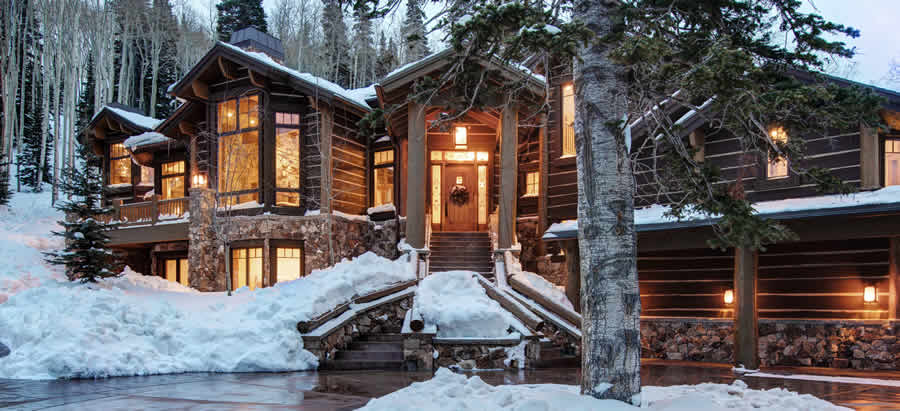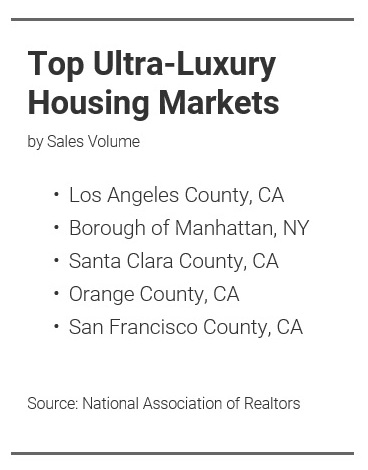LIFE-CHANGING EVENT OR SIMPLY OUTGROWING YOUR LUXURY HOME MIGHT SIGNAL IT’S TIME TO DIVEST
By Rochelle Mortensen
People choose to sell their luxury estates for as many reasons as there are to build them in the first place. Lifestyles change. Dreams and goals shift. Sometimes, it no longer makes sense to keep a home that’s rarely used.
Clients often ask if it’s a good time to be in the real estate market. For the answer, let’s turn to Nate Schar, director and founder of Heritage’s Luxury Real Estate department.
“It’s always a good time to be in the market,” Schar says. “It just depends on what you hope to accomplish. Do you want to maximize your return, get out from under a property you no longer need or want, or do you just want to move on to something that suits you better? There are different markets for every motivation.”
For sellers in today’s luxury housing market, one of the most important things to consider is this: Unlike a standard real estate market, luxury real estate competes with housing all over the world. Your location competes with similar locations everywhere. It’s critical to understand the level of available inventory of similar homes in similar locales. When inventory levels are high, economies are strong, and low interest rates persist, it’s a great time to be a seller. Buyers are enticed by their options. They are encouraged by an optimistic economy and are flush with cash. When buyers are confident, sellers do well.
Enlarge

So how is the luxury housing market doing right now?
According to the National Association of Realtors (NAR), there are quite a few markets across the country that are hot and getting hotter. San Francisco, unsurprisingly, has the highest volume of sales in the luxury market right now. There, the ultra-luxury market (top 1 percent of sales prices) carries an average sale price of $5.62 million. There were more than 2,000 luxury home sales in San Francisco in 2016.
The hottest market for luxury sales, however, isn’t in California. It’s San Juan County in Washington State. Luxury home prices increased more than 57 percent from 2015 to 2016 and ultra-luxury home prices doubled. NAR notes that San Juan County showed significant increases in top-tier prices, overall sales volume, and a reduction of the number of days on market.
NAR defines luxury housing as those priced either in the top 10 percent of home sales in a county, or the top 5 percent, depending on the index being used. Ultra luxury is the top 1 percent of sales prices in a given region. Each metropolitan region must have at least 10 such sales, they must be over $1 million and must be in the top 500 largest metros based on number of households.
IF YOU’RE CONSIDERING selling your home, you’ve probably already passed the time when you utilized the property the most. Maybe you’ve started to think about the opportunity costs you might be missing by holding onto a property instead of investing the money elsewhere.
Overall, using housing as a primary investment isn’t the best idea. Luxury housing is no exception. Housing generally follows inflation. In certain markets, at specific times, prices can exceed inflation rates, to be sure. Rapid increases in housing prices sound great, but that doesn’t take into account the overhead involved in owning the house including taxes, insurance, interest and utilities.
Holding costs for luxury homes can start to become an unnecessary burden if you’re not getting the same enjoyment out of the property that you once did. Renovation and maintenance costs no longer seem like wise investments when you just don’t need the place anymore. That’s not saying that buying a luxury home isn’t a good idea. It can be. If you can afford it and you get enjoyment from it, there’s no reason not to get the most out of life in a great house. Once you no longer need or want the property, however, it’s better to quickly liquidate the investment in favor of others that might prove more profitable or flexible.
Enlarge

As far as the strength of the economy goes, now may be the best possible time to capitalize on the equity in your luxury property. As recently as August 2017, The Economist predicted that the U.S. economy is starting to show signs of weakness, which could culminate in the first recession for the country in more than a decade. The Economist forecasts significant inflationary pressures and slack in the labor market as early as 2020. If that does happen, borrowing will become more expensive and any growth will be exceedingly slow. While global market growth is accelerating, it is limited by a lack of synchronicity across markets.
The good news is that at the moment, interest rates remain low and buyers are out in droves. In some areas, especially those on the coasts, the market for luxury homes equals billions of dollars in sales every year and the volume of homes sold is growing. Washington and California aside, there are other markets where luxury homes sales remain strong or are growing. New York, Hawaii, Massachusetts and Florida all have top-ranking markets. Even in Dallas County, more than 1,000 million-dollar homes have changed hands in the past 12 months – a 33 percent increase – and Dallas County doesn’t even rank in the top 20 fastest-growing luxury housing markets.

Shelley Connell of Fairway Mortgage in Flower Mound, Texas, says sellers should consider that now is a good time to capture buyers while they’re still in a favorable loan environment. It’s a good idea for buyers who do intend to finance to do so sooner rather than later, and buyers are beginning to get that sense, too.

“We’re still in a low-rate environment, so my advice would be to buy now before rates go up further,” Connell says. “Incremental interest rate hikes are expected to become more frequent into 2018, and experts predict higher interest rates than we have seen in many years,” Connell explains. “And right now, jumbo loans are staying in line with that. Compare that to earlier this year, when you could still get a jumbo under 4 percent. Those rates are rising.”
The good news for buyers needing larger loans, Connell adds, is that credit has been loosening a little bit for both conforming and jumbo. There’s more leniency with student loan debt, especially with certain professions. Student loan debt isn’t counting against borrowers as much if their expected professional field can typically support the loan type.
Connell advises that people look to their mortgage experts for advice on the best types of products.
“There may be times when it’s better to do a first and second loan rather than a jumbo loan,” Connell says. “What you’re going to see is that most mortgage lenders will do a side-by-side comparison if there’s an option to do either. Jumbos do take a bit longer to close and the restrictions are tougher. However, while rates on a first loan and a jumbo are comparable, when you add a second lien, the rate will usually be higher on that portion. It’s best to know all of your available options when considering a larger loan.”
THE MARKET FOR luxury homes is out there. In 2016, there were an estimated 1.65 million individuals whose income could readily afford a luxury home. That’s not including those whose household income would put them into that bracket. Evidence of their willingness to buy is also strong. It’s mostly a matter of location, condition, price point and amenities. The old real-estate trope is true. It’s still (mostly) about location, location, location.
“If you’re a buyer in the market for a luxury property,” Schar says, “you’ll have plenty of options to choose from in select markets. The inventory of ultra-luxury properties in Dallas is growing quickly. In the Northeast, the market is also flush with choices. If you’ve got some time to make a decision, watch the seasonality of the market and you could find even more options during peaks. In other regions, you’ll have plenty of competition, so if you find a property you like, you’d better be prepared to act fast.”
The bottom line is that the market for luxury real estate is strong today, and it is a great time to jump in if your situation in life is telling you to start thinking about a transition. Usually, if the thought has occurred to you, the answer is already clear. It’s time.
On the other hand, whether you’ve had a life-changing event or simply outgrown the usefulness of your luxury estate, changes in your personal needs often signal that it’s a good time for you to divest.
 ROCHELLE MORTENSEN is manager of Heritage Luxury Real Estate. To learn more about the luxury real estate auction process, contact Nate Schar at NateS@HA.com or call 214.409.1457.
ROCHELLE MORTENSEN is manager of Heritage Luxury Real Estate. To learn more about the luxury real estate auction process, contact Nate Schar at NateS@HA.com or call 214.409.1457.
Real Estate Platform Expanded
Heritage Auctions Luxury Real Estate conducts live auctions for estates valued at more than $2 million through its “Platinum Collection” line. The newly launched “Executive Collection” line offers an online auctions platform for homes in the $500,000 to $1.9 million range. For details, visit HA.com/LuxuryRealEstate or contact Nate Schar at NateS@HA.com or 855-261-0573.

